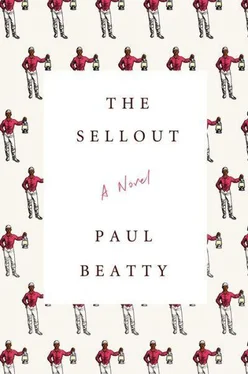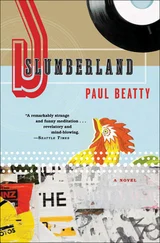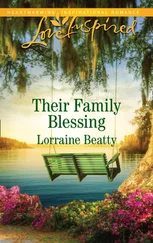During social studies, otherwise known in Dad’s curriculum as the Ways and Means of the Indefatigable White People, my father used to warn me about listening to rap or the blues with Caucasian strangers. And as I got older, I’d be admonished not to play Monopoly, drink more than two beers, or smoke weed with them either. For such activities can breed a false sense of familiarity. And nothing, from the hungry jungle cat to the African ferryboat, is more dangerous than a white person on what they think is familiar ground. And as Fred returns from exhaling a cloud of smoke out into the D.C. night, he has that Ain’t-I-a-Soul-Brother glint in his eyes. “Let me tell you something, my man. I’ve seen them all come through here. Racial profiling, interracial marriage, hate speech, and race-based set-asides, and you know what the difference is between my people and yours? As much as we both want seats at the ‘table,’ once you get inside, you motherfuckers never have an escape plan. Us? We’re prepared to leave at a moment’s notice. I never enter a restaurant, bowling alley, or an orgy without asking myself, If they choose this moment to come get me, how in the fuck am I getting out of here? Cost us a generation, but we learned our fucking lesson. They told you people, ‘School’s out. Ain’t no more lessons to be learned,’ and you dumb fucks believed them. Think about it, if the damn storm troopers were to knock on the door right now, what would you do? What’s your exit strategy?”
There’s a knock on the door. It’s a court officer gulping down the last of a prefabricated spicy tuna roll. She’s wondering why I have one leg dangling out of the window. Fred simply shakes his head. I look down. Even if I were to survive the three-story fall, I’d be trapped in a tacky marble courtyard. Walled in by thirty feet of overblown Colonial architecture. Surrounded by lion heads, bamboo stalks, red orchids, and a silty fountain. On our way out, Fred points to a small, Hobbit-sized side door behind a potted plant that presumably leads to the Promised Land.
I reenter the chambers to find an insanely pale white boy in my seat. It’s like he’s waited until the fourth quarter of the ball game to move down from the upper deck, sneak past the ushers to take a courtside chair vacated by some fan who’s left early to beat the traffic. I’m reminded of the black stand-up trope about white patrons returning to find “niggers in they seats” and drawing straws to decide who’s going to ask them to move.
“You in my seat, dude.”
“Hey, I just wanted to tell you that I feel like my constitutionality is on trial, too. And you don’t seem to have many people in your cheering section.” He waved his invisible pompoms in the air. Ricka-rocka! Ricka-rocka! Sis! Boom! Bah!
“I appreciate the support. Much needed. But just slide over one.”
The Justices file back into the courtroom. No one mentions my newfound tag-team partner. It’s been a long day. Bags have appeared under their eyes. Their robes have wrinkled and lost their sheen. In fact, the black Justice’s garment seems to be stained with barbecue sauce. The only two people in the courtroom who look fresh are the Jeffersonian Chief Justice and a mackadocious Hampton Fiske, each with not a hair out of place or displaying the slightest sign of fatigue. However, Hampton has one-upped the Chief Justice with a costume change. He’s now resplendent in an argumentative bell-bottomed, ball-hugging, chartreuse jumpsuit. He doffs his homburg, cape, and ivory-handled cane and adjusts his bulge, then stands aside, as the Chief Justice has an announcement to make.
“I know it’s been a trying day. I know that in this culture ‘race’ is especially hard to talk about, in that we feel the need to defer…”
The white kid next to me coughs an Animal House “bullshit” into his hand. And I softly ask this ghostly motherfucker his name, because it’s only right to know who’s fighting next to you in the trench.
“Adam Y___.”
“My man.”
I’m high as hell, but not high enough not to know that race is hard to “talk about” because it’s hard to talk about. The prevalence of child abuse in this country is hard to talk about, too, but you never hear people complaining about it. They just don’t talk about it. And when’s the last time you had a calm, measured conversation about the joys of consensual incest? Sometimes things are simply difficult to discuss, but I actually think the country does a decent job of addressing race, and when folks say, “Why can’t we talk about race more honestly?” What they really mean is “Why can’t you niggers be reasonable?” or “Fuck you, white boy. If I said what I really wanted to say, I’d get fired even faster than you’d fire me if race were any easier to talk about.” And by race we mean “niggers,” because no one of any persuasion seems to have any difficulty talking out-of-pocket shit about Native Americans, Latinos, Asians, and America’s newest race, the Celebrity.
Black people don’t even talk about race. Nothing’s attributable to color anymore. It’s all “mitigating circumstances.” The only people discussing “race” with any insight and courage are loud middle-aged white men who romanticize the Kennedys and Motown, well-read open-minded white kids like the tie-dyed familiar sitting next to me in the Free Tibet and Boba Fett T-shirt, a few freelance journalists in Detroit, and the American hikikomori who sit in their basements pounding away at their keyboards composing measured and well-thought-out responses to the endless torrent of racist online commentary. So thank goodness for MSNBC, Rick Rubin, the Black Guy at The Atlantic , Brown University, and the beautiful Supreme Court Justice from the Upper West Side, who, leaning coolly into her microphone, has finally asked the first question that makes any sense: “I think we’ve established the legal quandary here as to whether a violation of civil rights law that results in the very same achievement these heretofore mentioned statutes were meant to promote, yet have failed to achieve, is in fact a breach of said civil rights. What we must not fail to remember is that ‘separate but equal’ was struck down, not on any moral grounds, but on the basis that the Court found that separate can never be equal. And at a minimum, this case suggests we ask ourselves not if separate were indeed equal, but what about ‘separate and not quite equal, but infinitely better off than ever before.’ Me v. the United States of America demands a more fundamental examination of what we mean by ‘separate,’ by ‘equal,’ by ‘black.’ So let’s get down to the nitty-gritty — what do we mean by ‘black’?”
The best thing about Hampton Fiske, other than that he refuses to let seventies fashion die, is that he’s always prepared. He straightens a pair of lapels that sit atop his chest like giant tent flaps, and then clears his throat; a purposeful gesture he knows will make some people nervous. And he wants his audience on edge, because if nothing else, it means they’re attentive.
“So what is blackness, your honor? That’s a good question. The exact same one the immortal French author Jean Genet posed after being asked by an actor to write a play featuring an all-black cast, when he mused not only ‘What exactly is a black?’ but added the even more fundamental inquiry, ‘First of all, what is his color?’”
Hampton’s legal team pulls cords, and the drapes fall over the windows, while he walks to the light switch and douses the courtroom in pitch black. “In addition to Genet, many rappers and black thinkers have weighed in. An early rap quintet of puerile white poseurs known as Young Black Teenagers asserted that ‘Blackness is a state of mind.’ My client’s father, the esteemed African-American psychologist F. K. Me (may the genius motherfucker rest in peace), hypothesized that black identity is formed in stages. In his theory of Quintessential Blackness, Stage I is the Neophyte Negro. Here the black person exists in a state of preconsciousness. Just as many children would be afraid of the total darkness in which we now find ourselves immersed, the Neophyte Negro is afraid of his own blackness. A blackness that feels inescapable, infinite, and less than.” Hampton snaps his fingers, and a giant photo of Michael Jordan shilling for Nike is projected on all four walls of the courtroom, but it’s quickly replaced by successive photos of Colin Powell sharing his recipe for yellowcake uranium before the United Nations General Assembly shortly before the potluck invasion of Iraq and Condoleezza Rice lying through the gap in her teeth. These are African-Americans meant to illustrate his point. Exemplars of how self-hatred can compel one to value mainstream acceptance over self-respect and morality. Images of Cuba Gooding, Coral from The Real World , and Morgan Freeman all flit by. With references to such long-forgotten pop icons, Hampton is dating himself, but he continues his pitch: “He or she wants to be anything but black. They suffer from poor self-esteem and extremely ashy skin.” A portrait of the black Justice smoking a cigar and lining up a ten-foot putt splashes across the walls. Causing everyone, including the black Justice himself, to have a good laugh. “Stage I Negroes watch reruns of Friends , oblivious to the fact that whenever a white sitcom male dates a black woman on television, it’s always the homeliest white guy in the bunch getting some love from the sisters. It’s the Turtles, the Skreeches, the David Schwimmers, and the George Costanzas of the group…”
Читать дальше












